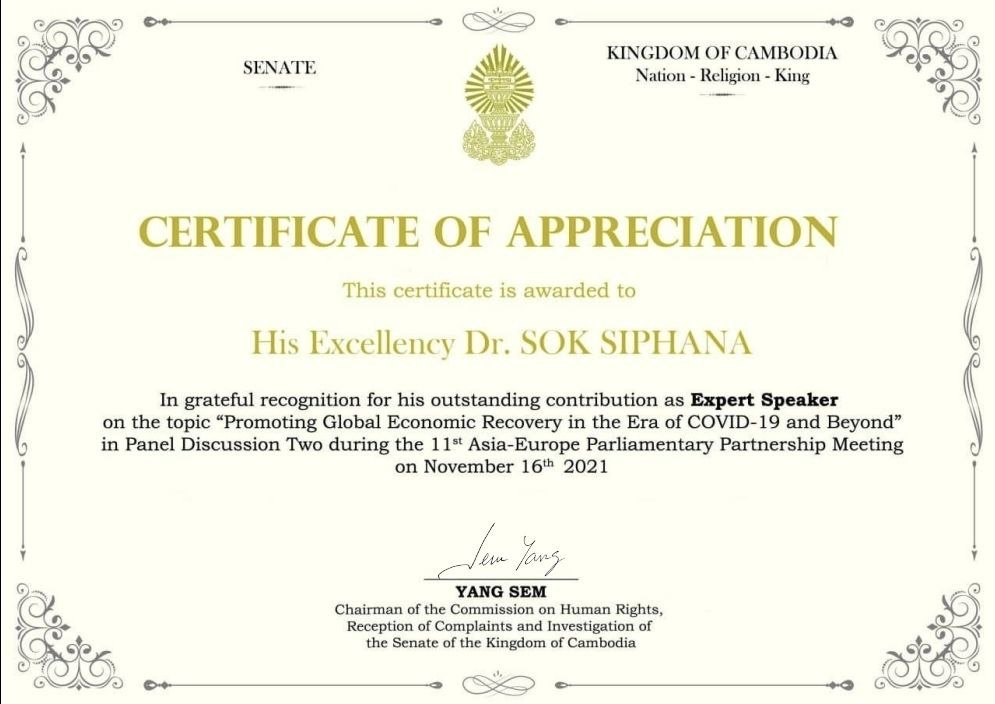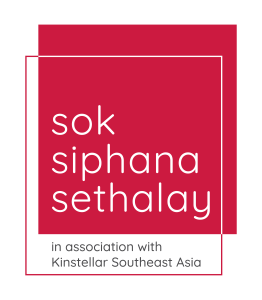Promoting Global Economic Recovery in the Era of COVID-19 and Beyond
Dr Sok Siphana, Founding Partner of SokSiphana&associates (a member of ZICO Law), had attended in the Panel Discussion as the Expert Speaker made at the Asia-Europe Parliamentary Partnership Meeting on last 16th November 2021.
The theme of this panel discussion is relevant for both Asia and Europe as it aims to tackle current issues challenging both regions.
To learn more on what Dr Sok Siphana had reflected on this debate, you may find below speech for your further reading.
Expert Intervention
by H.E. Dr. SOK Siphana
Senior Advisor to the Royal Government of Cambodia
Chairman of the Board, The Asian Vision Institute (AVI)
at the
11th Asia-Europe Parliamentary Partnership Meeting (ASEP11)
Panel Discussion 2: “Promoting Global Economic Recovery in the Era of COVID-19 and Beyond”
Conducted via Videoconference
16 November 2021, Phnom Penh, Kingdom of Cambodia
*****
– Honorable Speakers, Heads of Delegation and Representatives from the European and the Asian Parliaments,
– Excellencies, Ladies and Gentlemen,
1. Let me foremost express my thanks to the Organizing Committee of the ASEP11 for extending me this invitation to address this panel session in my expert capacity. It is indeed a great honor.
2. The ASEP11 theme “Strengthening Parliamentary Partnership for Peace and Sustainable Development in the Era of COVID-19 and Beyond” is highly relevant for both Asia and Europe as it aims to tackle current issues challenging both regions. The prospect for strengthening Asia and Europe parliamentary partnership is furthermore timely in the context of promoting global growth and prosperity in the post-COVID-19 pandemic era, the theme of this august panel discussion.
3. The interconnectedness and interdependence of Asia and Europe are so obvious. Just last December, ASEAN and the EU have uplifted its partnership to the level of a strategic partnership so that together they can better respond to inter-regional and global issues, as prominent as peace and security, economic growth, climate change and sustainable development, to mention just a few. This year Cambodia takes on its shared responsibility to host the ASEM 13 Summit, reflecting as well on its commitment to strengthen multilateralism for shared growth.
4. In this Session I will attempt to reflect three key issues so pertinent to this debate:
(i) What can the parliaments of the European and Asian countries do collectively in response to the global pandemic so as to expedite global economic recovery, while attempting to achieve the sustainable development goals?
(ii) What practical cooperation and partnership can be established to build a strong foundation for advancing inclusive growth and green recovery amidst the current global challenges caused by the COVID-19 pandemic? and last
(iii) What are the roles of parliamentary institutions and diplomacy in promoting socio-economic recovery toward shared prosperity in a post-pandemic world?
Honorable Asian and European Parliamentarians,
Ladies and Gentlemen,
5. In the context of our post-pandemic global economic recovery, I would like to clusters the key issues and responses into a holistic approach, and just for the sake of memory retention, I have labelled them as the “4Rs and 3Ps”, the 4Rs being: 1) Re-Opening; 2) Resetting; 3) Rebuilding; and 4) Resilience, and the 3Ps being: 1) People; 2) Prosperity; and 3) Planet. Indeed, a global pandemic needs a global and holistic response. A piecemeal and segmented approach would be inadequate and more than likely prolong the pandemic.
6. Let me start with the first “R”: Re-Opening. Contextually, it has been almost two years since the global outbreak of the COVID-19 pandemic. Its impacts are unprecedented in the history of mankind, affecting multifaceted aspects of social, political, and economic activities. Indeed, the scale of the pandemic has taken the world by surprise: Lives and livelihoods around the world were disrupted; the normal course of production, trade, and distribution came to a trickle; the tourism and travel sector came to a dead stop, literally speaking; across the world, business closures heightened uncertainties.
7. The harsh reality is that prolonged lock-downs are unsustainable. As much as they have saved lives, people’s livelihoods on the other hand were in serious jeopardy. To that effect, tentative efforts to reboot demand and consumption were made; travel bubbles or travel corridors were tried for essential businesses and other businesses with low to medium transmission risk such as manufacturing, construction and retail; business and investment confidence were gradually restored, helping workers and small businesses back on tract. With vaccine diplomacy in full swing, many countries have re-opened in very significant manner. Cambodia is indeed one of the first countries to do so for fully vaccinated people. We believe we may have reached herd immunity by now with more than 90 percent of our targeted population vaccinated.
8. The second “R” is Resetting the global parameters for a renewed growth. Structural reforms at the international level were attempted: reforms of multilateral agencies, i.e. the WHO and the WTO, and global governance architecture are all on the agenda; inter-regional partnership, i.e. the ASEAN-EU strategic partnership, set the contour of the new development approach; mega regional free trade agreements like the RCEP and the CPTPP are re-boosting global supply chains; the aim to start ASEAN-EU Free Trade Agreement negotiation is another powerful prospect.
9. At the national level we have witnessed a multitude of development initiatives aiming at promoting people-centred development model through employment creation and welfare maximisation: in other words, adaptation to the “new normal” and adoption of “new business models and strategies”.
10. The third “R” is Rebuilding the fundamental infrastructure framework for a recovery, starting with solid “Investment in Healthcare” with the promotion of public health security through R&D in medicine, vaccines and control of communicable diseases; better use of smart technologies in healthcare services and improving health insurance coverages. “Investment in Education” is next with the expansion of the use of appropriate technologies in education; integration of STI (Science, Technology, Innovation) in school and TVET curricula; linking schooling to industry practices and soft skills development. “Investment in the Fourth Industrial Revolution (4IR)” by incentivising R&D and R&D-industry linkages for new discoveries and breakthroughs is another angle of the Rebuilding process. This is a perfect match for Asia and Europe to cooperate and collaborate. Public and Private Partnerships (PPP) can be stimulated to build a tech-savvy talent pool from the current demographic dividend. Cambodia’s young labor force is prime to benefit from this. Encouraging tech start-ups to tap technological development and innovation in digital technologies to meet the needs and serve the best interest of our peoples is another viable avenue for growth.
11. The last “R” is Resilience. In sum, bringing together all the “4Rs” will enable us to achieve Resilience. Resilience through reconnecting our two continents; Resilience through our adaptation to the new norms; and Resilience through our innovation for a brighter future.
Honorable Parliamentarians, Ladies and Gentlemen,
12. Let me now turn to the “3Ps”, the three pillars of a true post-global recovery agenda.
13. People starts first. Here I am talking about social justice, social protection, and social inclusion. Social justice means the Rule of Law; the protection of rights, in particular the vulnerable groups. Social protection in terms of social safety nets, health insurance and other social benefits. Social inclusion in terms of enabling and facilitating people participation in social, cultural, political and economic affairs. In the post-pandemic world, a greater cooperation in culture-based innovation and culture-development nexus is much needed to promote cultural identity, advance cultural connectivity and enhance a harmonious and peaceful co-existence. Collaborative efforts to connect the many dots of cultural corridors via investing in arts and cultural and creative industries. Next week, the ASEM Cultural Festival will showcase that powerful link both in Phnom Penh and in Brussels. All these efforts made by our two regions will certainly go a long way to reverse the downward trend of social progress magnified by rising inequality, poverty and food insecurity caused by the COVID-19 pandemic.
14. The second “P” is Prosperity for our people through financial and digital inclusion, and inclusive education. Indeed with modern technologies we can ensure financial inclusion through more aggressive promotion of financial literacy; the provision of low-cost finance and widening financial access and coverage. Similarly, digital inclusion can be attained with a more inclusive digital literacy programme; the support for low-cost, secure and high-quality digital access; the expansion of digital infrastructure development toward a full-fledged digital economy, digital society and digital government. For its part, inclusive education is about bridging the urban-rural divide via enhancing a wider digital education programs within countries and across regions.
15. The last “P” is Planet, our Planet, mankind’s only home. The COP26 just concluded last week. That was the 26th COP already. How many more COPs before we could say we have saved our home? Green Growth and Circular Economy is the way to the future: Low-cost, efficiency-oriented technology in the use of natural resources, and eco-friendly waste management will be the norms. Climate change and adaptation is another urgent matter: Our commitment to neutral carbon emission targets is indeed a serious matter. Safeguarding our biodiversity, protecting and preserving our biospheres and natural ecosystems, including bird and plant species, is another imperative of our generation. To save our Planet Earth, it is clearly in the best interest for Asia and Europe to seek synergy to promote green, inclusive, and sustainable development.
Honorable Asian and European Parliamentarians,
Ladies and Gentlemen,
16. To sum up, ASEP11 has set a high expectation for a stronger global partnership whereby parliaments of both Asia and Europe can explore together opportunities and untapped potential in socio-cultural, political and economic relations to charter a collective recovery pathway amidst the COVID-19 crisis. It is a massive undertaking, and no country alone can address them, not even a region. An effective inter-regional parliamentary connectivity should be enhanced with more exchanges of enriched experiences and technical expertise at the hearth of this cooperation and partnership. That is my answer to the first question.
17. Both Asia and Europe should promote more comprehensive collaborations and partnerships in R&D in science, technology, innovations and inter-regional exchanges of new discoveries and breakthroughs in the era of the Fourth Industrial Revolution. R&D is a must, if we are to build a strong foundation for advancing inclusive growth and green recovery. Further efforts are needed to mobilize more funds and resources to advance large-scale international cooperation in food and crop science, health and medical science, in particular vaccine and medicine development. To help cope with the challenges, the Asian and European parliaments, in addition to its law-making role, can join governments and civil society organisations to mobilise and investing more resources in social protection and social entrepreneurship programmes that create jobs and provide decent income for the peoples. That is my answer to the second question.
18. As to the roles of parliamentary institutions and diplomacy in promoting socio-economic recovery toward shared prosperity in a post-pandemic world, ASEP11 is well positioned to chart the course of collaborative actions to raise the profile of all these critical issues through thorough in-depth reflections and debates. The COVID-19 has had immense, and in some cases unbearable, impacts on societies, especially women, children and vulnerable groups. They count on you all present here to push forward this agenda. Any transformative agenda starts with a voice and indeed the Asian and European parliamentarians do have a very loud voice.
19. Let me now bring my presentation to a close and express my thanks for your attention. Thank You.




